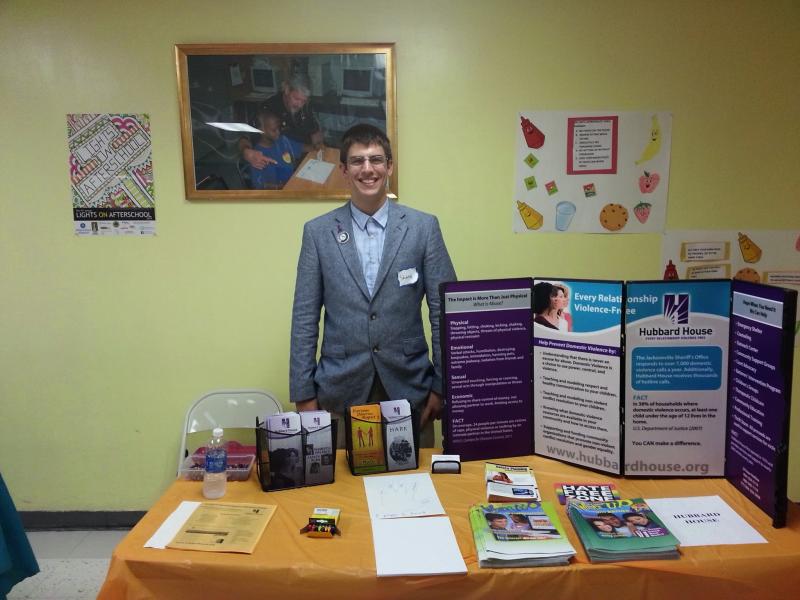Opening Eyes, Opening Doors
 I recently had the privilege of staffing a booth at a health and safety fair on behalf of my host site, Hubbard House. I was handing out brochures, promoting Domestic Violence Awareness Month, and educating attendees about domestic violence. One woman approached me as I began to take down the booth. She appeared to be in her early forties and had a long scar that ran along her face. With a friendly smile, I recited my introduction: “Good evening, my name is Shane and I serve as the Youth Prevention Facilitator for Hubbard House. Are you familiar with us?” She told me that she had a personal connection with domestic violence, since she was a survivor. It was as if all the commotion in the room had suddenly disappeared, leaving the woman and I alone. Some of the employees at Hubbard House are survivors, so this wasn’t the first time I had heard a survivor's story. Yet, this conversation was different. It was just so personal, so heartfelt, so powerful. I think it was so powerful because it was just her and I talking; she was telling me her story. She told me about the abuse, the fear, the pain, and that without the help of places like Hubbard House she would not be talking to me.
I recently had the privilege of staffing a booth at a health and safety fair on behalf of my host site, Hubbard House. I was handing out brochures, promoting Domestic Violence Awareness Month, and educating attendees about domestic violence. One woman approached me as I began to take down the booth. She appeared to be in her early forties and had a long scar that ran along her face. With a friendly smile, I recited my introduction: “Good evening, my name is Shane and I serve as the Youth Prevention Facilitator for Hubbard House. Are you familiar with us?” She told me that she had a personal connection with domestic violence, since she was a survivor. It was as if all the commotion in the room had suddenly disappeared, leaving the woman and I alone. Some of the employees at Hubbard House are survivors, so this wasn’t the first time I had heard a survivor's story. Yet, this conversation was different. It was just so personal, so heartfelt, so powerful. I think it was so powerful because it was just her and I talking; she was telling me her story. She told me about the abuse, the fear, the pain, and that without the help of places like Hubbard House she would not be talking to me.
A lot of what this woman said aligned with the information I had learned in my trainings. She talked about the psychological impacts of domestic violence on women. Sometimes the smallest thing, such as the slamming of a car door, can bring back devastating memories and experiences to a survivor. Victims often have very low self-esteem and poor self-image, stemming from their abuser’s constant ridicule and insults.
She spoke, very accurately, of domestic violence as a cycle. The abuse occurs, followed by apologies and promises to change which last for a little while, until the abuse begins again and the whole cycle starts over. She stated the same words that I learned in my trainings: “The abuser wants power over and control of.” She also asserted that the Why doesn’t she just leave? reaction to domestic violence victims needs to be eradicated. This view comes from a lack of understanding and awareness. To outsiders, it seems like the easiest thing to do is to leave, but in reality, it is usually the hardest thing to do.
Talking about domestic violence is difficult because it happens behind closed doors. People think that it’s a private matter between family members. A presenter at one of the trainings I attended posed an interesting question: People don’t think twice about calling the police if their neighbors are having a loud party, but do they call if they hear the couple next door screaming or fighting?
Speaking with the woman at the event Thursday really opened my eyes to the extent of and impact of domestic violence. Out of the 40 people in that room, I wonder if there were any other survivors, or maybe even people currently in abusive relationships. Domestic violence needs to be a public issue. Awareness and education are essential. Every relationship must be violence-free and above all, love shouldn’t hurt.

This blog was written by NFHC member Shane Kennedy.
Shane serves at Hubbard House as a Youth Prevention Facilitator.